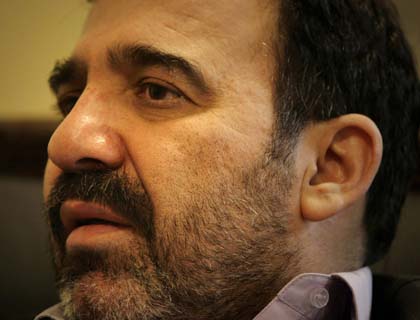The death of Ahmad Wali Karzai, President Karzai's half-brother, the chief of Kandahar's Provincial Council and a powerful figure in Southern Afghanistan, will be an irrepa rable loss to the government of Afghanistan in particular in the South where he was a major pillar of support to the government. Reportedly, Ahmad Wali Karzai was shot dead at his home in Southern city of Kandahar by a confidante and chief security guard whom he had worked with for many years. The death has already sent shockwaves up to capital Kabul where the dilemma faced by the President has become more compounded. Ahmad wali Karzai was a controversial figure in the Southern politics.
The usual controversies aside, he was a major pillar of support to the government of President Karzai in the South in whom the President had faith and counted on for balancing through the peculiar yet delicate politics of the South. It is not clear as of now who has been behind the killing of Ahmad Wali Karzai with speculations flying around as to the probable perpetrators. The Taliban can be a suspect given Ahmad wali Karzai's unrelenting defense of the government of Afghanistan and the fact that the Taliban had previously attempted to target him. He had survived a Taliban suicide attack on the Kandahar's Provincial Council office in 2009. However, apart from the Taliban as the usual suspects, he had many more other detractors and enemies.
Being a major regional figure and a heavyweight of regional politics as well as a prominent figure in business had incurred him many feuding detractors from inside and outside the country. These detractors harboring vendettas against him are much more likely to be in the wrong than the Taliban.
The impact of Ahmad Wali Karzai's death will have long resonance in the national politics of the country especially in the South and Kandahar where he was based. More importantly it is the Taliban and other militant groups who will stand to benefit the most from his death at a time when their insurgency is at its fiercest. The death also comes as a propaganda opportunity for the Taliban who were quick to take credit for the attack. It is certainly a major propaganda boost to the Taliban who use this opportunity to push their agenda and take over some more outposts in this critical war of perceptions. The common people, the man on the streets of the South for whose favorable perception the Taliban and the government have been fighting a ten-year-old war, are vulnerable to rightly or wrongly fall for this Taliban's propaganda ploy.
In the aftermath of the killing of a number of high-ranking officials in both South and North of the country including the killing of Daud Daud, the Police Commander for the North, Khan Mohammad Mojahid, Kandahar's Police Chief, Jawad Zahak, Bamiyan's Provincial Council Chief the death of Ahmad Wali Karzai will turn out to aid the Taliban and other militant groups in their drive to first and foremost win this ongoing war of perceptions. As the case with any other war throughout history, if territories are to be captured, first it is the perceptions that have to be conquered. The death of Ahmad Wali Karzai will strengthen the hands of the militant groups by undermining the perceptions of the people and their faith in a system that, in their view, seems incapable of providing security to the country's high and mighty.
The death of president Karzai's brother with its destabilizing effect has occurred at a time when the country is bracing itself for the first phase of security transition process to begin shortly. It does not bode well for the future of the delicate power equations in the South carefully put together over the past years by Wali Karzai. The coalition of diverse tribes and clans that he brought together and which greatly contributed to the relative stability of politics in the South now stands in jeopardy. The President must now be thinking hard how to minimize the damage emanating from the loss and maintain order in a region and politics that are incredibly tough and demanding to handle.
Not withstanding the death of Kandahar's point man, the process of transition of security responsibilities will unfold as planned by the government of Afghanistan in partnership with the international forces. The town of Lashkargah in the neighboring province of Helmand will be officially handed over to Afghan National Security Forces(ANSF) later this month although it is the Afghan National Security Forces who have been providing security for the city for some time.
Three provinces, Kabul minus Sorubi District, Panjsher and Bamyan, will be completely handed over to ANSF. Providing security and stability to the country's various regions and provinces, in addition to having trained and capable security forces, requires handling of the regional and local politics in accordance with the region's sensitivities and the local social structures. This is more so in the Southern and Eastern provinces where the local politics and politicking are nuanced and sensitive given the multitude of social and political constituencies, each wanting its share in the regional power structure.
It is certainly up to the central government in Kabul to take a constructive, sustainable and progressive approach to the issue of government and governance in the country's various regions including the South and East. One particular concern is the danger of alienation of the regional centers of social and political power and the rise in regionalism in Afghan politics especially beyond 2014.
Part of the solution of course would be a just, unbiased and balanced treatment of all regions and provinces by the government at the center which can to a large extent forestall regional alienations and the potential rise in regionalism. It is interesting to know that the state's failure to fulfill this role has to an extent resulted into stoking the fires of insurgency and insecurity. The government must think anew and right the past wrongs.

